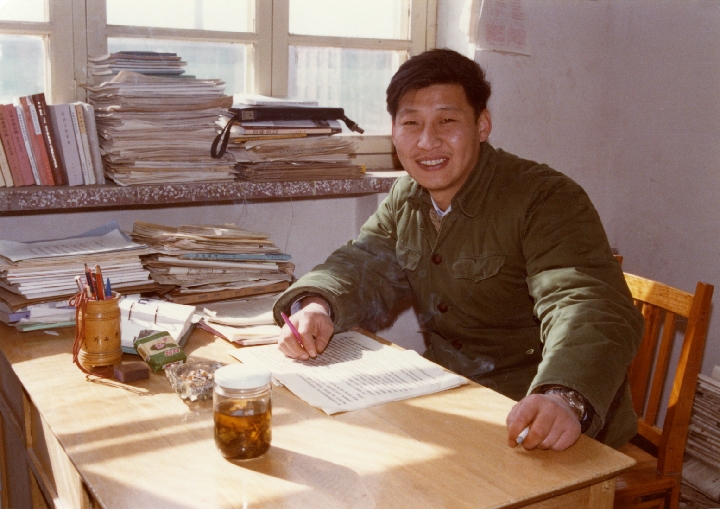Xi Jinping attaches great importance to elementary education. “Education is the very foundation for developing the country. We must spare no efforts in this area,” he said.
In 1982, shortly after he assumed office as the deputy secretary of the CPC Zhengding County Committee in North China’s Hebei Province, Xi inspected the dilapidated buildings in schools throughout the county. He found 3,590 square meters of dilapidated school buildings in more than 200 rural primary schools. Tens of thousands of students studied in classrooms with concrete slabs and clay tables as their desks and 40,000 of them even had to bring their own chairs from home.

This file photo taken in 1983 shows Xi Jinping in his office in Zhengding County. (File Photo)
During an inspection of the grassroots-level education in rural Zhengding, Xi frowned when he stepped into a primary school. The playground was just the noisy road outside the school with trucks and tractors shuttling back and forth. The school buildings were old and dirty. Students used desks made of cement and soil in classrooms with no glass in the windows. Some students even sat on the floor when having classes because of a lack of chairs. Zhou Weisi, a journalist who interviewed Xi, told a story about how Xi valued education in Zhengding.
Xi criticized the headmaster. “How can you bear to see a dilapidated school like this?” Xi asked.
"Considering your village’s conditions, you definitely have ways to run a school better than this! You must take quick action or you’ll be dismissed,” Xi told the head of the village, who promised to improve the school facility immediately.
"Someone told me it was the first time Xi lost his temper in Zhengding,” said Zhou.
On October 13, 1983, Xi heard that students in Nanyonggu village of Nanniu community were suspended from school because water was leaking into the school building. Xi immediately issued a request that the Party committee of the Nanniu should know the gap between the conditions in Nanyonggu Primary School and the requirements of the Party, and that they should take effective measures to quickly improve the school's condition. At the same time, Xi sent officials to the scene to help solve the problem.
In October 1983, Xi made it clear that education must be reformed. The county raised the substitute teachers’ salaries and paid the arrears of teachers’ salaries. Teachers, especially those in private schools, felt greatly encouraged.
“Even if you did well in other areas, you are not a good secretary if you cannot improve the conditions of schooling,” Xi said when censuring a local official in Lishuangdian community for the shabby school buildings.
Xi asked cadres at all levels of the county to raise their awareness of improving education and caring about the construction and development of schools. He also donated money to help a village improve its school conditions. He strove to improve school conditions throughout his term in Zhengding.
In 1984, the Zhengding government raised 1.87 million yuan (China’s per capita net income was 355.3 yuan in 1984.) to improve primary school buildings. A total of 1,020 dilapidated school buildings with an area of nearly 15,000 square meters were renovated, with more than 3,000 sets of newly-purchased desks and chairs. New school buildings were built in 16 villages. In the meantime, many playgrounds, once occupied for other uses, were returned to schools. The conditions of primary schools were greatly improved.
(Compiled by Zhang Jian and Cao Mengqi)


